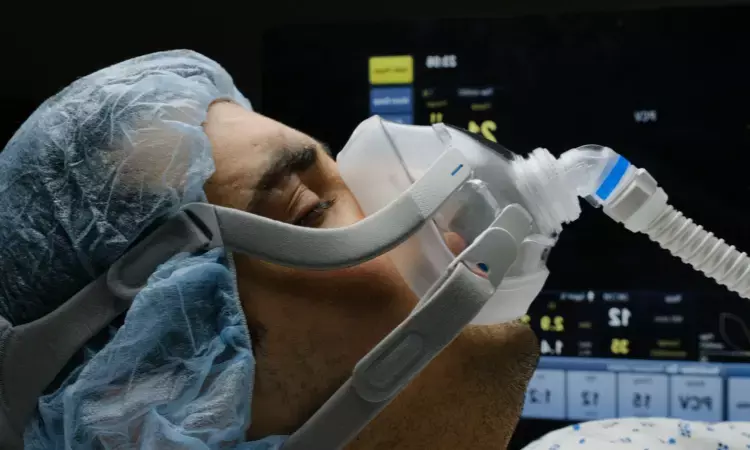- Home
- Medical news & Guidelines
- Anesthesiology
- Cardiology and CTVS
- Critical Care
- Dentistry
- Dermatology
- Diabetes and Endocrinology
- ENT
- Gastroenterology
- Medicine
- Nephrology
- Neurology
- Obstretics-Gynaecology
- Oncology
- Ophthalmology
- Orthopaedics
- Pediatrics-Neonatology
- Psychiatry
- Pulmonology
- Radiology
- Surgery
- Urology
- Laboratory Medicine
- Diet
- Nursing
- Paramedical
- Physiotherapy
- Health news
- Fact Check
- Bone Health Fact Check
- Brain Health Fact Check
- Cancer Related Fact Check
- Child Care Fact Check
- Dental and oral health fact check
- Diabetes and metabolic health fact check
- Diet and Nutrition Fact Check
- Eye and ENT Care Fact Check
- Fitness fact check
- Gut health fact check
- Heart health fact check
- Kidney health fact check
- Medical education fact check
- Men's health fact check
- Respiratory fact check
- Skin and hair care fact check
- Vaccine and Immunization fact check
- Women's health fact check
- AYUSH
- State News
- Andaman and Nicobar Islands
- Andhra Pradesh
- Arunachal Pradesh
- Assam
- Bihar
- Chandigarh
- Chattisgarh
- Dadra and Nagar Haveli
- Daman and Diu
- Delhi
- Goa
- Gujarat
- Haryana
- Himachal Pradesh
- Jammu & Kashmir
- Jharkhand
- Karnataka
- Kerala
- Ladakh
- Lakshadweep
- Madhya Pradesh
- Maharashtra
- Manipur
- Meghalaya
- Mizoram
- Nagaland
- Odisha
- Puducherry
- Punjab
- Rajasthan
- Sikkim
- Tamil Nadu
- Telangana
- Tripura
- Uttar Pradesh
- Uttrakhand
- West Bengal
- Medical Education
- Industry
Etomidate for anesthetic induction may cause minimal changes in systemic hemodynamics in TBI, finds Study

Maintaining optimal cerebral perfusion and oxygenation following anesthetic induction is crucial for preventing secondary brain insults in vulnerable acute brain injury patients and is a primary goal in the neurosurgical management of traumatic brain injury. Recent observational study compared the effects of three different anesthetic induction agents - etomidate, thiopental, and propofol - on systemic hemodynamics, regional cerebral oxygenation (rScO2), and serum cortisol levels in patients with acute traumatic brain injury (TBI).
The key findings of the study were: 1. Hemodynamic changes: Etomidate induction resulted in the least hemodynamic changes, with a significant decrease in mean arterial pressure (MAP) and heart rate (HR) observed with thiopental and propofol induction compared to etomidate. 2. Cerebral oxygenation: All three induction agents led to a significant increase in bilateral rScO2 after induction. The increase in contralateral rScO2 was maximal with etomidate compared to propofol. The trend changes in bilateral rScO2 were comparable between thiopental and etomidate. 3. Serum cortisol: An insignificant decrease in serum cortisol levels was observed with etomidate and thiopental, while a significant increase was seen with propofol at 24 hours post-induction. 4. Neurological outcome: The Glasgow Coma Scale (GCS) score improved significantly in all three groups at discharge, with no significant differences between the groups. In conclusion, in patients with acute TBI, anesthetic induction with etomidate resulted in the most stable hemodynamics and maximal increase in cerebral oxygenation compared to thiopental and propofol. Additionally, etomidate showed an insignificant impact on serum cortisol levels. The neurological outcome at discharge was comparable across the three induction agents.
Key Points -
Here are the 6 key points from the scientific article:
1. Hemodynamic changes: Etomidate induction resulted in the least hemodynamic changes, with a significant decrease in mean arterial pressure (MAP) and heart rate (HR) observed with thiopental and propofol induction compared to etomidate.
2. Cerebral oxygenation: All three induction agents led to a significant increase in bilateral regional cerebral oxygenation (rScO2) after induction. The increase in contralateral rScO2 was maximal with etomidate compared to propofol. The trend changes in bilateral rScO2 were comparable between thiopental and etomidate.
3. Serum cortisol: An insignificant decrease in serum cortisol levels was observed with etomidate and thiopental, while a significant increase was seen with propofol at 24 hours post-induction.
4. Neurological outcome: The Glasgow Coma Scale (GCS) score improved significantly in all three groups at discharge, with no significant differences between the groups.
5. Conclusion: In patients with acute traumatic brain injury (TBI), anesthetic induction with etomidate resulted in the most stable hemodynamics and maximal increase in cerebral oxygenation compared to thiopental and propofol.
6. Conclusion: Additionally, etomidate showed an insignificant impact on serum cortisol levels. The neurological outcome at discharge was comparable across the three induction agents.
Reference –
Sharma KK, Surve RM, Reddy KRM, Christopher R, Chakrabarti D, Pandarisamy S, et al. Impact of anesthetic induction with etomidate, thiopentone, and propofol on regional cerebral oxygenation: An observational study in patients with traumatic brain injury. J Anaesthesiol Clin Pharmacol 2024. DOI:10.4103/joacp.joacp_315_23.
MBBS, MD (Anaesthesiology), FNB (Cardiac Anaesthesiology)
Dr Monish Raut is a practicing Cardiac Anesthesiologist. He completed his MBBS at Government Medical College, Nagpur, and pursued his MD in Anesthesiology at BJ Medical College, Pune. Further specializing in Cardiac Anesthesiology, Dr Raut earned his FNB in Cardiac Anesthesiology from Sir Ganga Ram Hospital, Delhi.
Dr Kamal Kant Kohli-MBBS, DTCD- a chest specialist with more than 30 years of practice and a flair for writing clinical articles, Dr Kamal Kant Kohli joined Medical Dialogues as a Chief Editor of Medical News. Besides writing articles, as an editor, he proofreads and verifies all the medical content published on Medical Dialogues including those coming from journals, studies,medical conferences,guidelines etc. Email: drkohli@medicaldialogues.in. Contact no. 011-43720751


